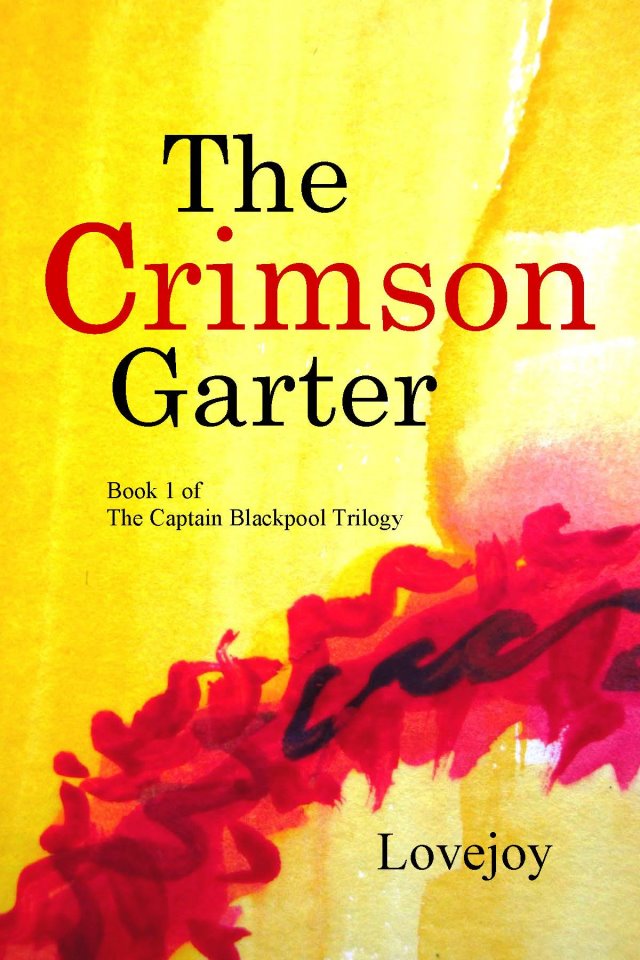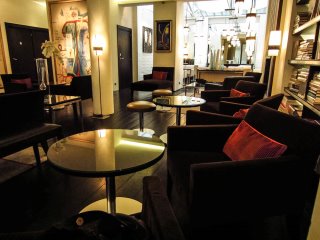
La Fragolina reflects on the bargain that led to her marrying Sir Robert Marsh, who has an unlikely visitor staying with him by the name of Humphrey, the Earl of Pinckney. Meanwhile, Balthazar, who has painted a realistic likeness of her, forbids his friend Misha Stefan from exhibiting the work—and agrees to a marriage to Gertrud von Thyssen, to restore his family fortune, lands and title. He composes a letter to La Fragolina, entrusting its delivery to Misha. We present chapter three of our serialization of The Crimson Garter, by travel editor Stanley Moss, writing pseudonymously as Lovejoy
Chapter 3
Letter from Humphrey, Earl of Pinckney
To Amanda Pennington-Smythe
Written from Marshmoor, Scotland
My Dear Amanda,
It gave me great joy to learn you received the claret and are enjoying it and that your sister has improved in health because of the wine’s curative powers. Your letter was most appreciated, except for one small but excruciating detail: I beg you again not to call me ‘Pinky,’ although it warms my heart that you regard me so affectionately.
As I had expected, Marshmoor presents many marvellous opportunities for hunting and fishing. And despite his propensity for taciturnity I believe that my host Sir Robert is truly happy that I am here. He continues to be a private man, and I am still saddened by the absence of his wife. I find Sir Robert all the more unfortunate because his beloved mother seems often perturbed. Lady Dorothea, a woman of strong opinions and regal bearing, does occasionally join us for dinner. Sir Robert’s invisible wife must be a most frail creature.
You will be interested to know that Marshmoor has historical significance. Several protracted renovations are in progress: numerous mounds of stone clutter the approach, and Sir Robert informs me that the crumbling East Tower is being rebuilt, though he cannot give a date for its completion. I believe that there are a number of fine tapestries hanging in the West Wing, but the perpetual darkness of the halls and rooms prevents me from appreciating family portraits attributed to noted painters whose names I am loath to recollect. Sir Robert assures me they are excellent likenesses of his forebears. I fancy I would find their faces rather stern and dour, not unlike the countenance of my host, who reveres his ancestors.
On a few occasions I have managed to reach to the neighbouring village to visit the local establishments. A respectful hush descends whenever I am present, because, naturally, all the villagers know I am a guest at Marshmoor. Also, there seems to be, at this time of year, a shortage of eggs and bread, for whenever I breakfast, the Lady Dorothea presides over a meagre meal consisting of oatmeal and molasses. She is quite munificent in the dispensation of that, while I have noticed that at luncheon there is only one fowl to be served, always accompanied by smallish potatoes. At teatime Lady Dorothea does offer scones, but rarely is there clotted cream. Where I had expected a plethora of smoked local salmon I find only butter sandwiches. This lack of custom genuinely puzzles me.
My host is ever genial, but only about hunting. He allows me the run of the grounds, and trusts me completely with the use of his firearms. The fact that I bring in such game has made a difference in the variety offered at table. But poor Sir Robert has a problem with his servants, and I am of course far too discreet to say anything about it. The cook, maid and butler in his employ are inferior characters, whom I suspect pilfer shamelessly from him. No matter how much game I take, only half of what I give to the cook appears on the table. And then there is the shortage of wood and peat. Fires are only stoked once a day. By the time I retire, numerous blankets must be piled on the bed to sleep comfortably. Forgive me for this rather intimate detail, dear Amanda.
I hope that this letter finds you well, and that you and your sister continue to enjoy good health,
Your most obedient and affectionate servant,
Humphrey, Earl of Pinckney
It took Captain Blackpool several days to visit all the inns and public houses in the vicinity. At the end of the second day he got lucky. He had disguised himself as John Angus, an itinerant labourer. He told everyone he had come to the area in search of a distant relative, for whom he carried news of a small inheritance. Of course the relative was a fiction, as was the inheritance, but people were happy to listen and happier to help. They did not know they had been turned into his network of informers. From them he quickly gained a sense of everyday life at Marshmoor. He wondered how the ballerina could survive here. It was beautiful and rugged, but slow-paced, and filled with small minds.
The Arrows, a modest inn, lay on a coach road surrounded by fields. It was a neat little place, which Blackpool liked immediately, and the smell of bread baking met him as soon as he went inside. There was a tidy bar, with shelves of local whiskies arrayed behind it, and polished brass fittings. A grizzled old man with an unruly reddish beard sat at a table, picking through papers. Captain Blackpool nodded amiably, sat down with him and launched into his cover story, which the man listened to politely. Once he had finished, the innkeeper gave him a warm grin.
‘You don’t have to fib to me, Sergeant Blackpool,’ he said. ‘You probably don’t remember me, Lance Corporal Donnie MacMillan from the Fifth Highland Regiment in Kandahar, but I remember you. At your service, sir. We was all so very proud of you, sir, the way you stood up to Maharajah of Jaipur so many years ago.’
‘MacMillan, yes. Of course I know the Fifth, a superior regiment.’
‘Shipped me home after the campaigns, they did, and I set up this place. I heard rumours about you. They sent you after Vashtar, didn’t they?’
‘That they did.’
‘Did you catch him?’
‘One man couldn’t catch Vashtar by himself. It took a lot of us. He stopped bothering people after we found him.’
‘I knew it,’ MacMillan said with delight, slapping at the air triumphantly. ‘You got the bugger after all. Now, what brings you to this gawdawful place?’
‘I’m here for my health,’ Captian Blackpool said.
The innkeeper laugher raucously. ‘Still acting like a Gurkha, aren’t you? At your service, sir. Just tell me what it is I can do to help. I need some excitement.’
Captain Blackpool leaned forward, and the men planned.
With his usual effectiveness, Captain Blackpool collected information. He watched every member of Marshmoor’s staff, and spoke to Molly, a downstairs maid. From her he learned she had a sick son, that she thought Sir Robert exceedingly handsome, that Grazia lived a life of repetition and drudgery. The prima ballerina from the Paris Opéra spent her days embroidering, reading, taking her meals alone upstairs, and occasionally making expeditions on foot to the highest point she could hike, weather permitting, where she could be seen staring off into the distance. A single letter occasionally arrived for her, usually postmarked Paris, but otherwise she was completely isolated. In the public houses and inns he overheard gossiping voices describe Lady Grace Marsh enigmatically. Some thought she was conceited, others found her the kindest soul they had ever encountered, and many remembered how charming she was when she first arrived; today, when they saw her—which was rarely—she acted remote, silent, humbled.
From Potts, the coachman, he learned that Lady Dorothea continually complained about her health, that the old woman was addicted to laudanum, and that she spoke to her daughter-in-law usually once a week, despite the fact that they occupied apartments no more than 200 feet apart on the second floor of the main house. Mr Dobkin, the local rector, made a valiant effort at saying flattering things about Sir Robert Marsh, to no avail. His cold demeanour, his awkwardness with words, his parsimonious habits left little to be balanced with admiring statements.
Captain Blackpool surveyed the manor from the woods nearby. He could detect no threat, no sinister presences attempting to intrude on their tranquillity. On several occasions he entered the house unknown to anyone, and he visited every room, for no lock had been designed which could stop him. There was nothing to suggest even the slightest corruption there, in fact Marshmoor was a place frozen in time, where history had not intruded for at least 200 years. Captain Blackpool wrote to Rodolfo Lopez, there is no danger here. I will report again later.
In the far end of the West Wing, in a musty study surrounded by books of all description, Sir Robert sat in a worn leather chair, smoking a pipe. It was a favourite room of his, and one to which he retired each afternoon, to peruse a volume, read his mail, smoke his pipe and enjoy his solitude, a dank room where the walls were lined up to the ceiling with shelves of leather-bound tomes. In spite of his great frugality Sir Robert had managed to acquire a huge number of antique editions scavenged from the estates of impoverished barons who were liquidating their own libraries. Among these collections he often found many a philosophical work which engaged his interest.
His chair was old and once elegant, in perpetual disrepair, with little hope for restoration. The red leather had wrinkled and cracked, and the seat dipped in the middle, in need of a cushion, which Sir Robert always told himself he should obtain, but never quite did. A thick tweed lap robe was thrown over his legs, on which rested an enormous volume atop which he had placed an open binder of correspondence. He was at this very moment poised to study it, and he chewed contentedly on the pipe in a meditative way. At his elbow a decanter of port waited untouched, for Sir Robert always rewarded himself in the last half-hour of his solitude with a modest glassful of the expensive liquid. An empty silence pervaded the room, punctuated only by Sir Robert’s puffing and the intermittent flick of a page.
He now attacked the binder of correspondence, beginning with a letter describing the unexpected sale of the Wickham library, which contained several volumes of philosophy he had long coveted. His bookseller in London reported that the collection had been unexpectedly withdrawn from auction due to an irrefutable offer from an unnamed connoisseur. Said connoisseur wished to protect his own anonymity and had completed the purchase through an agent. This unusual turn of events baffled Marsh. Such a thing had never happened to him in all his years of collecting. First he suffered profound disappointment, and then growing annoyance. The Wickham Library had been under his particular surveillance for years. He had patiently lain in wait for the eventual demise of the last Wickham, and he had presumed that he alone was aware of the existence of an especially rare twelfth-century treatise entitled Cogitations on Identity, by the Scandinavian philosopher Torvald Herdvig. The treatise was in fact so rare that few of the most knowledgeable scholars had cited it. The last reference Sir Robert ferreted out had been over three centuries earlier. Who, Sir Robert asked himself, could possibly be cognisant enough to understand its importance and value? Had another buyer as astute as he suddenly entered into the rarified market and now competed with him for the most precious works extant? Robert Marsh’s curiosity was also piqued. If such a gentleman existed, would he not be a formidable correspondent, fellow scholar, or at least adversary in the contests of academic collecting? The letter concluded by mentioning that the mysterious buyer planned to attend the auction of the estate of Lady Gobersleeves in two short weeks, that it was known he intended to bid on a rare and precious necklace of 104 matched pearls, which had last belonged to the Maharajah of Jaipur. I must learn who this man is, Marsh told himself. In an uncharacteristically impulsive decision he determined he would travel to London and attend the auction. Perhaps a short trip south to the capital, he thought, would also serve to lift Grace’s spirits. She had been sulking for months.
An irritating, regular rapping interrupted his concentration. Cedric, the elderly butler, emaciated, pasty-faced, who had worked his entire career for the family, shuffled into the room and stood with hands clasped. ‘My apologies, sir, but your mother wishes to see you at your earliest convenience.’ Sir Robert looked up sharply and frowned. He understood this euphemism from his mother all too well, that he should come without hesitation. And so he reluctantly closed the binder, and started on the long hike to her chambers, which were at the far end of the manor.
It took Sir Robert several minutes to walk the length of the main house to the other wing, where his mother’s apartment was located at the extreme end of the second floor. First he navigated a wide staircase, which was covered by a brown carpet, slippery in spots because the nap had worn down smooth. At the top of the stairs he continued down a cavernous corridor, where at every third step the floorboards gave off with an emphatic squeak. Sir Robert looked up to his left and noted the condition of several leaded glass windows sorely in need of repair, which he reminded himself he would fix in the near future. He was puzzled by why his mother had summoned him so urgently, but at the door he took a moment to rearrange his tie and make sure his jacket was straight before entering, as he had always done since he was a boy. He knocked, heard her bid come in. The room was all too familiar to him, and he associated it with discomfort and pain.
As usual, the place was blazingly hot, for his mother kept a fire burning all the time. She sat by the window on a day bed, the blinds drawn open. Her grey hair was pulled back severely, and she wore a high collar, starched blouse, and a long black skirt. She was an unattractive woman, with a beakish nose and a flinty stare. ‘Sit down, Robert,’ she commanded. ‘There is something we must discuss.’ And motioned to a low and delicate chair upon which he settled himself uncomfortably. Sir Robert was somewhat mystified that she had asked him to sit down, a custom that was absolutely uncharacteristic of their relationship. It was then that he noticed her gloved hands held a letter and an article, which appeared to have been clipped from a newspaper. ‘I believe you should take a look at this, Robert,’ she informed him.
From Treadwell’s Continental Gazeteer
Scandal in Paris
Your correspondent now returns to his discussion on the subject of the puzzling retirement of Grazia Rosetti, known as La Fragolina, who was until recently prima ballerina of the Paris Opéra. In the weeks following her mysterious disappearance from the city, there has been much speculation over the true motivation for this sudden and early end to a promising career.
Now a painting has surfaced which further encourages the fire of debate. This reporter has personally viewed the painting and believes it poses some delicate questions concerning La Fragolina’s activities before she left the City of Lights. The portrait in question has been exhibited at the Gallery Misha Stefan, on the Cour de Rohan. It is attributed to an enigmatic artist known only by the name of Balthazar, about which little else has been revealed, save that he is a Magyar.
This most revealing likeness of La Fragolina depicts her boldly, and is entitled The Crimson Garter. The renowned ballerina is shown wearing her signature black velvet neck ribbon, and only one other item of clothing, the object named in the title of the painting, which she wears on her left thigh. After the editor of the Cahiers de la République recommended that responsible citizens avoid this work at all costs, the salon has been besieged by interested art lovers. It follows that there is a bidding frenzy for the painting, that magnificent sums have already been named.
M. Stefan remains unavailable for comment. And Balthazar was nowhere to be found on opening night. Nor has he since resurfaced. It is further rumoured that the prima ballerina Tatiana Stregova has already contacted M. Stefan to arrange for a sitting so that a similar likeness of herself can be painted and exhibited.
It is this reporter’s concerted opinion that the ultimate owner of this artistic work will not regret the extravagance of expenditure to obtain such a remarkable and tantalizing æsthetic experience.
Related articles hand-picked by our editors
 John Pearse: for a lifetime
John Pearse: for a lifetime
Stanley Moss finds the ideal fabric—but it’s up to John Pearse of London to shape it into a bespoke jacket
 Two Parisian hideaways
Two Parisian hideaways
Stanley Moss looks at two distinctive Parisian hotels on opposite sides of town, with very different characters
photographs by Paula Sweet and courtesy Hôtel Le A
 What do you think about that?
What do you think about that?
Stanley Moss has alternative perspectives on previewing the Biennale di Venezia
photographed by Paula Sweet
Advertisement
Copyright ©1997–2022 by JY&A Media, part of Jack Yan & Associates. All rights reserved. JY&A terms and conditions and privacy policy apply to viewing this site. All prices in US dollars except where indicated. Contact us here.